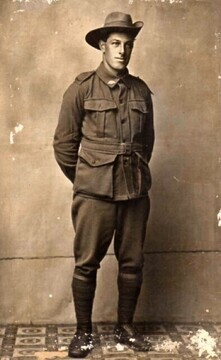
CAMPBELL, Harry William
| Service Number: | 3364 |
|---|---|
| Enlisted: | 2 January 1917 |
| Last Rank: | Private |
| Last Unit: | 54th Infantry Battalion |
| Born: | Greenwell Point, New South Wales, Australia, January 1895 |
| Home Town: | Nowra, Shoalhaven Shire, New South Wales |
| Schooling: | Not yet discovered |
| Occupation: | Labourer |
| Died: | Killed in action, France, 24 April 1918 |
| Cemetery: |
Aubigny British Cemetery Row D, Grave No. 1. IN MEMORY OF THE DEARLY LOVED SON OF MR. & MRS. CAMPBELL OF NOWRA |
| Memorials: | Australian War Memorial Roll of Honour, Nowra - All Saints War Memorial Lych Gate, Nowra Soldiers Memorial |
World War 1 Service
| 2 Jan 1917: | Enlisted AIF WW1, Private, 3364, 54th Infantry Battalion | |
|---|---|---|
| 24 Jan 1917: | Involvement Private, 3364, 54th Infantry Battalion, --- :embarkation_roll: roll_number: '19' embarkation_place: Sydney embarkation_ship: HMAT Anchises embarkation_ship_number: A68 public_note: '' | |
| 24 Jan 1917: | Embarked Private, 3364, 54th Infantry Battalion, HMAT Anchises, Sydney |
Help us honour Harry William Campbell's service by contributing information, stories, and images so that they can be preserved for future generations.
Add my storyBiography contributed by Stephen Brooks
Harry William Campbell was the son of George and Sarah Ann Campbell, of Nowra, New South Wales.
His younger brother, 2323 Trooper John Thomas Campbell 7th Australian Light Horse Regiment was killed in action in Palestine on 9 November 1917, aged 19.
Harry arrived in France during September 1917 and died during the fighting to save Villers Bretonneux during April 1918.
An officer wrote a letter to his mother which was printed in the Nowra Leader during June 1918, "Dear Mrs. Campbell, — It is my painful duty to give you what details I can about the death of your son Pte. H. W. Campbell, killed in action 25/4/18. Your son was in No. 12 Platoon, commanded by myself. On the 25th we were in support in the trenches N. E. of Viller-Bretonneux, a village near Amiens. At 5 a.m. the enemy dropped a very heavy barrage onto our trench. It was very intense and there was no way out of it. About half an hour from the start a shell burst right alongside your son and another man, killing both instantaneously. Your son knew nothing about it and suffered no pain. At night I caused the body of your son to be carried out to the little village of Aubigney, and laid in the cemetery…...I have not yet had a chance to see what has been done to mark his grave, but you can rest assured that I shall give the matter my personal attention at the first opportunity. In conclusion I offer you my sympathy and all your sons comrades in your loss. —I am, Yours sincerely, (Sgd). D. McARTHUR, Lieut. C. Coy., 54th Battalion."









